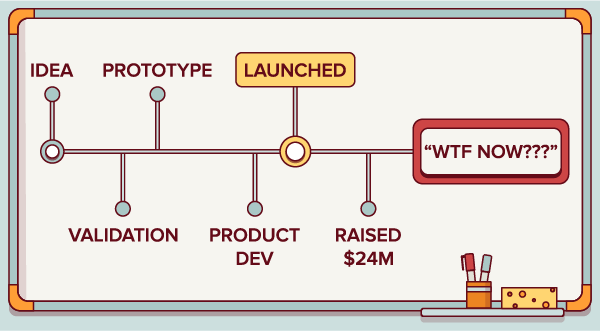Wil Schroter

I grew up ridiculously poor.
By the time I was 19, I founded my first startup, with less than $20 in the bank. I chose the one career that could somehow make me way, way poorer.
Within the first year I had racked up over $100,000 in personal debt, which took me from "poor" to "infinitely poor.” Today we call that college debt.
Sometimes "The Bet" Pays off
Within a few years some of the startup bets I had made began paying off.
Before I knew it, I was shopping for exotic cars, a new home (I was still living in a campus apartment at the time) and writing a single check to payoff all my college debt (a smaller check since I dropped out so quickly).
In my mind, I had made it.
But then a funny thing happened... nothing. Nothing at all. I woke up in a nicer house, drove to work in a nicer car and spent less time worrying about debt.
It all feels unbelievable at first. And then a few weeks go by, you adjust like anything else in life, and you find yourself doing all the things you've always been doing.
Success is the Great Distractor
Since then I've spoken to countless Founders about what happened after they "made it" and consistently the answer is "nothing."
We all go on a shopping spree and buy a bunch of stuff we always thought we wanted, then once that wears off, we go back to watching Netflix and complaining about politics.
It turns out that "making it" isn't a full time job.
Conversely, being stressed the hell out about being in debt absolutely feels like a full time job.
Not having things is a full time job. But achieving those things creates the absence of that worry (which is wonderful) but it doesn't replace itself with another full time equivalent.
So Success isn't a Big Deal?
No, success is a big deal, especially when you don't have it.
But you'd be surprised how hollow our experiences are once we're on the other side of that finish line. We almost universally learn that the things that occupy our day are largely the same.
We scratch our heads and say, "Didn't I already have this before?" And the answer is "yes."
In Case You Missed It
How I Went From Log Cabin to Entrepreneurial Success. InList co-Founder & CEO Gideon Kimbrell discusses how entrepreneurial success isn’t an achievement — it’s a process. And no matter how big you make it, there’s always a new challenge over the next hill.
My Startup Failed — But I Was Still Successful. Khalid Boukdid, Founder of Arbio.io, had experienced every phase of startup disappointment imaginable, but in that moment, he had actually achieved success. He just didn’t realize it yet.
How Long Will it Take to Have a Successful Startup? Launching a startup can happen really quickly. Making it a real business — now, that takes a lot of time. But how much time does it take to make a startup successful?
Find this article helpful?
This is just a small sample! Register to unlock our in-depth courses, hundreds of video courses, and a library of playbooks and articles to grow your startup fast. Let us Let us show you!
Submission confirms agreement to our Terms of Service and Privacy Policy.
Already a member? Login
No comments yet.
Start a Membership to join the discussion.
Already a member? Login
